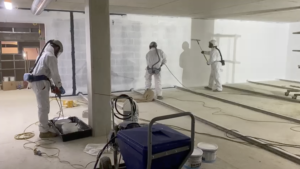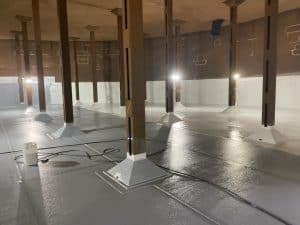5 Reasons Coatings Fail
Coatings are widely used in various industries to protect surfaces from corrosion, wear and tear, and other forms of damage.
When coatings fail, the substrate underneath becomes exposed to various environmental factors, which can lead to corrosion, degradation, and other forms of damage. This can result in reduced performance, decreased lifespan, and even complete failure of the substrate.
There are several reasons why coatings fail, and in this blog, we will discuss five of them.
Inadequate surface preparation
One of the most common reasons why coatings fail is inadequate surface preparation. A surface that is not properly prepared will not bond well with the coating, and this can lead to adhesion failure. Inadequate surface preparation can include failing to remove rust, dirt, oil, or other contaminants from the surface, or failing to properly blast the surface to the required industry standard. Before applying a coating, it is essential to thoroughly clean and prepare the surface to ensure proper adhesion.
Poor quality coatings
Another reason why coatings fail is the use of poor quality coatings. Low-quality coatings may have inferior ingredients or may not have been formulated to withstand the environmental conditions that they will be exposed to. For example, a coating that is designed for indoor use may not hold up well in outdoor conditions. To ensure that coatings perform as expected, it is important to use high-quality coatings that are formulated to meet the specific requirements of the application.
Improper application
Even the highest quality coatings can fail if they are not applied correctly. Improper application can include applying the coating too thick or too thin, using the wrong type of applicator, or failing to follow the manufacturer’s instructions. Coatings that are applied too thick may not dry properly, while coatings that are applied too thin may not provide adequate protection. It is important to follow the manufacturer’s instructions carefully and to use the appropriate applicator for the type of coating being applied.
Environmental conditions
The environmental conditions that a coating is exposed to can have a significant impact on its performance. Coatings that are exposed to extreme temperatures, high humidity, or corrosive chemicals may fail to perform as expected. For example, a coating that is designed for use in a dry environment may not hold up well in a humid environment. It is important to choose a coating that is designed to withstand the environmental conditions it will be exposed to and to monitor the conditions regularly to ensure that the coating is performing as expected.
Aging and wear and tear
Over time, all coatings will eventually experience aging and wear and tear, and this can lead to failure. As coatings age, they may become brittle, crack, or peel, reducing their effectiveness. In addition, coatings that are exposed to high levels of wear and tear may become damaged, reducing their ability to protect the underlying surface. It is important to monitor coatings regularly and to replace them when they begin to show signs of ageing or damage.
In conclusion, coatings can fail if not properly applied or maintained. Using high-quality coating systems and working with an experienced coating contractor will prevent coating failures and ensure long-lasting protection for surfaces.
Do you need a custom quote for your project?
Our Work
5 Key Factors of Energy-Efficient Design
5 Key Factors of Energy Efficient Design In today’s world, where environmental concerns and energy costs are top of mind, designing buildings that are not

Blowerproof for Durham History Centre
Airtight Coating for Durham History Centre THE CHALLENGE Our client was restoring the Durham History Centre, located in the historic Grade II listed Mount Oswald

Epoxy Coating for Aviation Fuel Facility
Epoxy Coating for Aviation Fuel Tank THE CHALLENGE The client’s aviation fuel tanks required a new lining system as part of their scheduled maintenance. While
